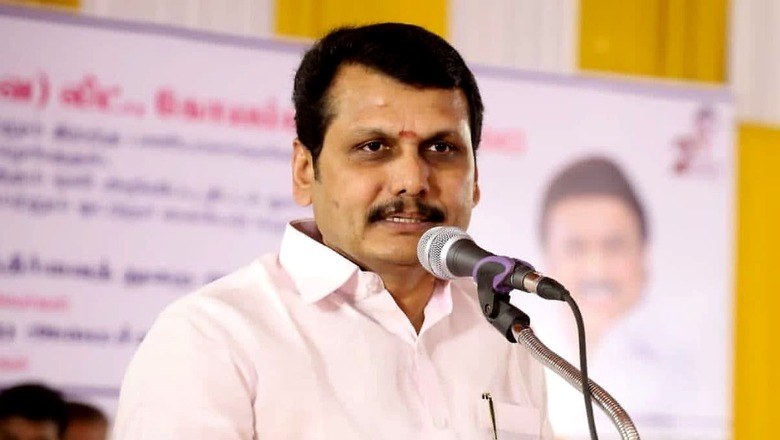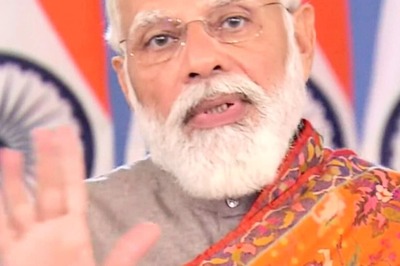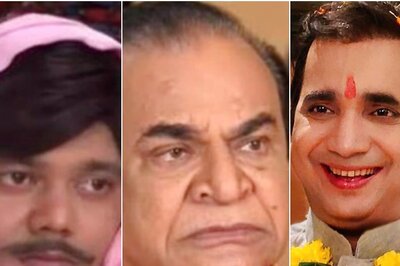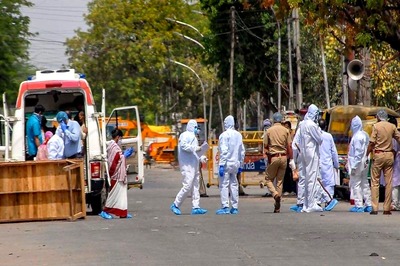
views
V Senthil Balaji, the minister of electricity and prohibition and excise in Tamil Nadu, has often been known as controversy’s child. His dramatic arrest by the Enforcement Directorate comes as part of an ongoing investigation into a job racket dating back to his time as transport minister between 2011 and 2016.
This move is also being seen as a significant power play after the DMK came to power in 2021. This arrest has dealt a major blow to Balaji’s defence until now that he had previously admitted to a “compromise” with the victims in the scam. But this was also interpreted as an indirect admission of guilt, strengthening the corruption and bribery allegations against him.
Though a minister in the DMK, Balaji’s political trajectory has been interesting. He was a staunch follower of former Tamil Nadu chief minister J Jayalalithaa and her confidante VK Sasikala, and even called himself their “slave”. When Jayalalithaa went to jail in the disproportionate assets case, Balaji was one of the names doing the rounds for the likely stand-in chief minister. This, despite him being a lot junior to the rest of the cabinet.
After Jayalalithaa’s death in 2016, he joined TTV Dhinakaran’s Amma Makkal Munnetra Kazhagam after playing a key role in the leader’s electoral win in Jayalalithaa’s erstwhile RK Nagar seat. Despite being part of the AIADMK, Balaji is rumoured to have funded Dhinakaran’s entire campaign at RK Nagar; he is also known to have clandestinely planned and executed a near picture perfect victory in the prestigious seat.
Balaji is also said to be responsible for the extraordinary gimmick that won Dhinakaran the seat – handing over Rs 20 notes to voters with the promise of Rs 6,000 per head after the elections. Those enthusiastic voted for the AMMK but were furious to find that the promised Rs 6,000 never arrived and they would have to be satisfied with only Rs 20.
In 2018, however, he made a move to the DMK. Ironically, before Balaji joined the DMK, it was MK Stalin who had campaigned against him and made several allegations of corruption and land grabbing during the 2016 election campaign.
Balaji entered politics at the age of 21 and was elected as a member of the Karur Panchayat Union in 1996 and 2002. Four years later, in 2006, he emerged victorious as the MLA of Karur constituency, which he fought on an AIADMK ticket. His proximity to Jayalalithaa and Sasikala proved instrumental in propelling his career forward. He also served as the transport minister from 2011 to 2015.
In 2015, Balaji faced a major setback when he was unceremoniously removed from the cabinet. Known for his strong political will, he once again contested from Aravakurichi in 2016. But following Jayalalithaa’s death that year, he joined the AMMK. He had a fallout with the leadership and, in December 2018, switched allegiance to join the Stalin-led DMK. He was given a party ticket in the 2019 bypoll for the Aravakurichi seat, which he won.
The DMK’s triumph in the 2021 elections further solidified his political standing, securing him another term as an MLA, this time from Karur. He was made a cabinet minister in May 2021, with the formation of the DMK government in Tamil Nadu with two portfolios – electricity as well as prohibition and excise.
These ministries marked a new phase in his political career, where he assumed responsibility for pivotal portfolios in the state administration. But it is worth noting that Balaji’s political journey has not been devoid of controversies.
His 2021 election affidavit revealed the existence of 30 FIRs against him. Additionally, he faced allegations in the 2014 recruitment scam, where aspirants for transport department jobs accused him of accepting money but failing to provide the promised employment. The case reached the Madras High Court, which dismissed it after the complainants stated that they had reached a settlement with him.
In 2021, when Tamil Nadu reeled from power cuts and load shedding, he famously made the statement that squirrels running on power lines were causing outages, earning him the moniker ‘Anil Balaji’ (Anil meaning squirrel in Tamil). In the same year, the ED also began an investigation into the case and requested relevant documents. Although the high court allowed the inspection of the documents, copying them was prohibited, leading to a subsequent challenge.
Allegations of corruption involving Balaji are linked to a recruitment drive conducted by the state-run Metropolitan Transport Corporation in November 2014, when he was the minister. The controversy surfaced after the corporation released five separate advertisements to fill different positions, including drivers, conductors, tradesmen and engineers.
A complaint was filed in October 2015 by a person called Devasagayam, who claimed to have given Rs 2.6 lakh to a conductor named Palani in exchange for securing his son’s employment in the transport corporation. It was later learnt that Devasagayam’s son never got the promised job, and the money he had entrusted was never returned. This complaint, however, did not implicate Balaji.
Subsequently, in March 2016, another individual named Gopi lodged a similar complaint. Gopi alleged that he had paid Rs 2.4 lakh to two individuals purportedly associated with Balaji, with the expectation of obtaining a conductor position. Gopi filed a case in the Madras HC, seeking an investigation into his complaint.
Initially, the HC quashed the summons but the matter eventually reached the Supreme Court, which granted the ED the authority to continue the investigation and inspect the related documents. Importantly, the court rejected Balaji’s application for a special investigation team to look into the matter.
The court later also dismissed claims that the charges against Balaji were politically motivated, suggesting that his power and position shielded him from prosecution during his tenure.




















Comments
0 comment